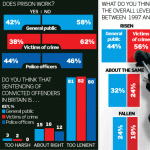We need to get sentencing right
Fay Selvan is CEO of The Big Life group of social businesses and charities which works across the north of England. The group deliver a range of services and opportunities to the most excluded people, including The Big Issue in the North, primary care and mental health services, family intervention, employment and supported housing.
“I don’t know if the scariest thing I heard this week was when talking to Adrian (a young lad on our Community Payback scheme, who was there because he had committed a ‘domestic’) or John (who was there for driving under the inflluence).
Adrian said he had never had a job, and didn’t want a job. He just ‘got by’. That’s what he did. Community Payback was just a necessary evil which he would have to do. He felt no stake in society, he was scary because he was so disengaged. Whatever we think of David Cameron’s description of an ‘underclass’ – there are some people in society who feel they have nothing to lose and no reason to contribute.
In contrast John was scary for the opposite reason. A socially skilled, engaging lad with 10 GCSE’s, who once planned on going to University; he had moved to avoid the gang life he grew up in. He knew right from wrong but couldn’t help but be dragged into a culture of reprisals. He had a five year prison sentence for GBH after getting involved in a fight and was now doing Community Payback for driving without insurance. When talking about his future he said he had got his CSCS card to work on a construction site – but as we all know there are no jobs there. University wasn’t back on the options list. Would he go back to his old lifestyle I asked? He shrugged his shoulders – ‘I don’t want to but…….its easier isn’t it?’
How scary is that? Even the people who want to change find it easier to go back to a life of crime than to get a job.
We get stuck in our schizophrenic approach to criminal justice. Do we want to punish people for doing something wrong/unacceptable to society – in which case – it should be hard punishment. Offenders shouldn’t have more opportunities than anyone else. It’s tough out there for everyone. Or do we want to stop them offending again – in which case – we should do everything we can to help them move away from offending.
The reality is we want both. And of course, now, we also want to do both as cheaply as possible!
The Make Justice Work ‘Community or Custody’ report clearly shows that effective community sentencing is more value for money than traditional prison sentences for low level offenders. It is cheaper and reduces re-offending more than short sentences. But it also makes clear that really effective approaches to reducing re-offending need programmes that address the underlying causes of criminal activity – lack of stable accommodation, low educational attainment, lack of employment opportunities, addictions and mental health issues. Unfortunately these programmes are few and far between.
Our Skills to Build business offers one year’s employment and training to people who have been involved in low level offending. The teams deliver contracts for Housing Associations – repairing fences, emptying void properties, landscaping, painting and cleaning properties. For Stuart it was a life saver. He had left school at 16 without any qualifications and after being laid off from general labouring jobs, started selling weed. His biggest regret is that his son was there when the police raided his house and arrested him. He then spiralled into depression, splitting from his partner and being sentenced to Community Service and Drug Treatment Order.
He found the Community Service gave him structure to his life again – somewhere he had to be at a certain time of day, working with other people and doing something meaningful. One of our Community Payback Supervisors tells me that he thinks some of the lads purposefully breach when they are coming to an end, so that their hours are extended – worrying that they will find themselves sat at home with nothing to do again.
When Stuart completed his Community Service he started applying for jobs, but began to worry he would never work again. Getting the job with Skills to Build was a real breakthrough: ‘I was up against 30 other people, and I know its not like a proper job – but now every morning my son sees me get up and put on my work clothes and go out of the house to a job – he has something to respect me for’. He just worries about what will happen at the end of the year. Skills to Build has a 50% into work rate, but there is no guarantee there will be a job out there for Stuart.
Dale lives in one of our supported housing projects. Brought up in care and a heroin addict since he was fifteen, he has spent all his adulthood living in hostels or being in prison for shoplifting and petty crime. He describes living in a hostel as living with constant tension – always worried who would be coming into your room to steal something or bother you for money. He has just moved into our new housing project where he has his own studio flat and support from staff. He thinks now he will be able to really sort his life out. Whilst he is on a methadone programme already he admits he ‘tops up’. He has been abstinent once before and thinks he can do it again. A great artist, he is now providing artwork for the walls and wants to attend an art class. ‘Why don’t you run the art class in here?’ I ask. ‘Oh, I couldn’t do that – I’m not good enough’ he replied. And he didn’t mean his art wasn’t good enough – he truly meant ‘he’ wasn’t good enough.
I am not sure if it is too late for the Adrians of this world, sometimes it feels like we are just too late to right whatever damage has been done in his life. But then I remember that you never really can tell who is going to grab the opportunity to change – working with our clients I am always surprised!
What I do know though is, if we really are going to make an impact on reducing offending, then we not only need to get the sentencing right – but also need to get the support right – to help people move away from offending and really improve their lives.”







